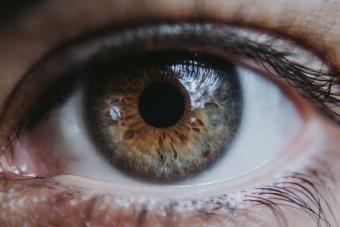Spot a Liar

Tone of Voice

Stiff Body

Touching Mouth

Scratching Nose

Tightness Around the Lips

Uneven Body

The Eyes Have It

Pupil Widening

Too Much or Too Little

Gender Differences

Don't Get Fooled

© 2025 LoveToKnow Media. All rights reserved.
Tamsen holds a bachelor's degree in psychology and completed graduate studies in clinical counseling.
Read MoreLearn about our Editorial Policy.

Once you learn how to tell if someone is lying, communication takes on an entirely new layer of understanding. People generally have both verbal and non-verbal communication revealing their lies because lying isn't natural to them - their body reacts to being in an unnatural state.

A person who is lying may speak at a higher pitch than normal or might stumble over their words. If what they're saying sounds rehearsed, it probably is.

A liar's body may stiffen up as he makes a false statement. Suddenly crossing the arms may indicate the person is feeling like he needs to shield himself.

An individual who covers his or her mouth while speaking may be lying. It may be a subtle cover, perhaps merely touching the lips. This gesture indicates the body is trying to stop the words from coming out because they aren't true.

Touching the nose during or after a statement may indicate the statement is a lie. This is sometimes called the "Pinocchio Effect." The brain sends an impulse to the tip of the nose when a lie is spoken, and the touch is an unconscious reaction to that impulse.
It may look like a brief touch, a scratch, or even a rub of the nose.

Look for tightness in the mouth area as a sign of lying. This is another instance in which the body tries to stop the words from coming out. If the person appears to be having trouble getting the words out because the mouth just seems like it won't cooperate, this may be a sign of lying.

If a person has one hand in a fist while the other hand is open, or if the feet seem to be pointing in different directions, it may be that the person speaking doesn't truly believe what they are saying.
In this instance, it's likely the person isn't setting out to be deceptive, but instead is saying things they wished they believed, but simply don't. An example might be a partner who asserts their love verbally, yet has an uneven body telling another story.

Looking up and to the left while talking indicates recalling a memory, while looking up and to the right while talking indicates fabricating a lie.
For example, when asking a boyfriend for details on his night, his eyes may look up and to the left as he recalls the places he went and the people he saw, but then when the eyes drift up and to the right, he's giving a false account of what happened next.

The eyes' pupils stay fairly consistent in conversation (unless the light source changes) but will dilate under two other circumstances:
Keep in mind that widening pupils may not always indicate deceit, but may instead indicate attraction.

One of two things will likely happen when you're being lied to. Either the person will talk more than normal, giving too many details, or will seem to clam up and not give many details at all. You can tell the person is lying if they speak in a way contrary to how they typically speak.
So the person who is usually verbose not saying many words, or the person who usually doesn't talk much suddenly giving you too many words, is probably lying.

There aren't any surefire signs of deceit that are specific to men or women. When people lie, they display signs of deceit regardless of their gender.

Once you can easily recognize the signs of someone lying to you, it becomes far easier to know who is actually for you and who is against you.
Don't be surprised if you're shocked by the sheer number of lies that come your way on a daily basis. Try to figure out why people feel the need to be deceitful, and if perhaps the people in your life are there for the wrong reasons.